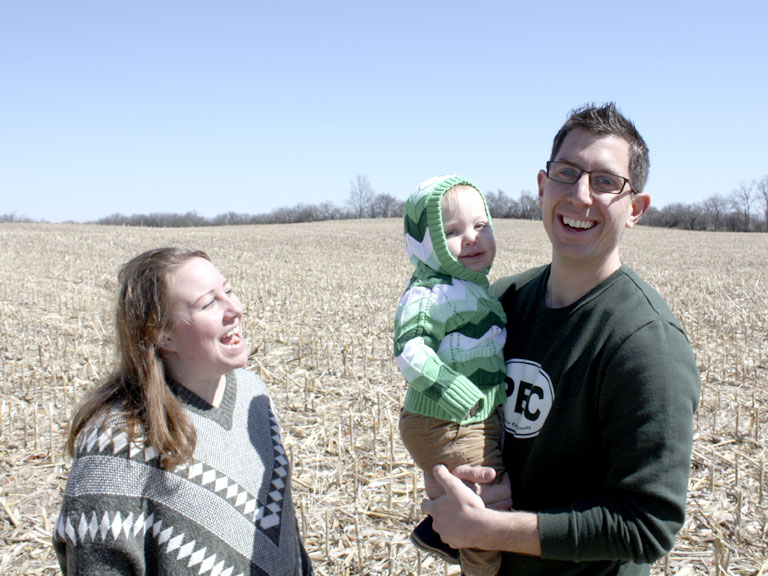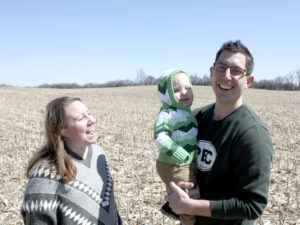County News
Cider Man

Ryan Monkman is laying the groundwork for his future, and it starts with mushrooms
Some people say that you need 2.5 jobs in the County to survive. Some may say that 2.5 is not enough. For Ryan Monkman and his family, 2.5 is not even close when you have big dreams. Monkman is a man of many talents, and they are all being put to the test at once. The adage “strike while the iron is hot” is a good one for him, and currently the iron is red hot. Aside from his days consulting for wineries and cider houses, Monkman has recently started his own cider company and has partnered up with Keint-He winery to help produce and sell his cider over the counter there. He and his wife, Nicole, also just purchased 35 acres of land at Danforth and Benway that will become an orchard where they will grow their cider apples. The land will also become a farm that will host livestock and a plethora of other things.
All these endeavours have been set in motion just recently. It’s something that he and his family must jump into with both feet and hope for the best. Luckily there is no one better to take on this challenge.

(L-R): Nicole Monkman, Linden Monkman (13 months) and Ryan Monkman at the site of their future orchard and biodynamic farm.
Cider is something that Monkman knows incredibly well, and he has a very specific vision of the future orchard. He is enamoured with the old varietals of apples and the orchards that used to dot this landscape. To make the cider he wants to make, his farm must have the right apple trees, and so first, his new land needs the right soil. So for the time being he’s going to become a mushroom farmer to help reawaken the wild apples that edge his farm in the hedgerows.
“All the apples were torn out of this farmland years ago. But the birds and deer of that time ate the apples in the orchard and would deposit them in the hedgerows, so if you look down the Millennium Trail and around the farms, it’s full of apples and those are the descendants of the apples that used to be grown here. That’s what we want to bring back,” says Monkman.
Years from now his goal is plant an orchard from wild apple trees, but his first job is to get those trees healthy. Mushrooms break down undergrowth and turn fallen trees into nutrients for future trees. They feed new growth and clear out clutter so new trees can take root. For Monkman, mushrooms are key to a closed-loop hedgerow. He calls mushrooms “The Silver Bullet.”
Closing the loop regarding farming is something that he and his wife are also passionate about. Since they moved out here two years ago, their dream was to plant an orchard of heritage cider apples to be used for cider making. They also want to have a biodynamic farm, which is organic, but with animals and using cosmic rhythms.
“These apple varietals that mostly come from northern France and western England are starting to go extinct, and we don’t want them to go away because people like drinking cider made from them, so it’s a way to combine those two passions.”
Monkman ordered the apple trees two years ago, because he knew it would take a while to source the varieties he wanted. The couple will start planting the trees next year. Because the cidery had yet to be built and the trees are years away, Monkman found Keint-He winery and started leasing space from them to make and store the cider. Monkman loves the idea of fermenting and aging cider in oak barrels. so this was a perfect pairing. He is quite thankful to the Keint-He winery for being so open to having a cidery housed within their establishment.
The name of the cider company is FieldBird, and the majority of the cider he sells is still cider, not sparkling, and it’s bottled in a wine bottle. Still cider is traditionally the way it was made, and it’s able to be done so because of the acids, the tannins and intensity of flavour, which mellows in the oak barrels. This year of the more than 400 cases of cider made by FieldBird, only 10 cases were sparkling.
The two-year-old trees that Monkman has purchased for his orchard are still years away from producing fruit, so he will continue to rely on local providers for his apple supply. He has chosen the largest varietal of apple trees for this orchard so even if he gets them in the ground this year, he won’t see any apple harvesting until 2024.
It’s a long game, which is why he has time to work on his hedgerows and set up the infrastructure for his farm and his cidery. This year the area of the farm that will host the orchard will be planted with cover crop and next year they will start planting the trees. They will have 600 trees, mostly from endangered varietals of apples. This year on the farm they will also start a market garden as well planting other fruit trees, such as pears. Some of the pear trees chosen by Monkman are on varietal watchlists, so they have people begging them to plant these varietals because they are literally going extinct. The barn structure will be coming either this season or next depending on timing.
One thing that Monkman would be remiss if he didn’t mention was how the cooperation and the welcoming nature of the people in the County is so abundant.
“We were bottling yesterday, and we were using a bottle filler that we borrowed from Dave Gillingham up at Domaine Darius. Batista came by to help us. The bottles were the same bottles used from another winery down the road. It’s all about borrowing and trading and helping,” says Monkman.
Really, the dream is not to farm apples. The Monkmans want to take care of their farm, nurture it and one of the symbols of the farm are apples that they can turn into cider. Having a biodynamic farm means treating soil fertility, plant growth and livestock care as a single system, working together to survive. It excludes the use of artificial chemicals, and some methods use an astrological sowing and planting calendar. Biodynamic farming also uses various herbals and minerals for field sprays. The goal is for it all to come from the farm. Every year they hope to add a little more. While most people are striving to complete things, the hope for the Monkmans is that it’s never done. There is no end. But that’s the beauty of farm like this. Everything happens in cycles and everything eventually goes back into the ground.
FieldBird Cider is available over the counter at Keint-He Winery.

Ryan and his family is putting heart and soul into his work,,he will treat his ciders like his family I think he will be very successful.good luck.